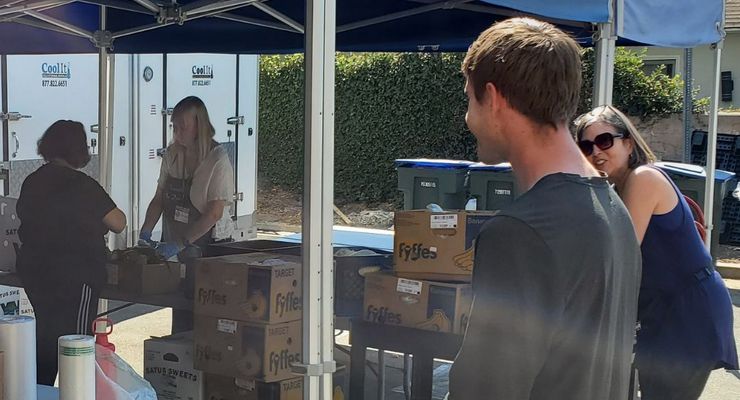
Friends In Deed Food Pantry reports it is “already experiencing more demand than at any previous point in the program’s history,” serving over 800 households last week compared to an average of 605 from the previous year, according to Ryan Greer, Vice President of Programs.
Across the region, Long Beach Community Table is now serving 7,000 people per week, up from 5,000 before the shutdown. Staff say donations have dropped sharply, and some pantry refrigerators are nearly empty. If the shutdown persists, demand could reach 10,000 weekly by year’s end, experts caution.
According to a background report dated October 28 summarizing a USDA official notice, SNAP benefits will not be issued on November 1 if the federal government shutdown continues. Approximately 42 million people nationwide—about one in eight Americans—depend on SNAP and would be affected by a November halt, according to USDA data cited in the same report.
The shutdown’s impact extends across Los Angeles County, where officials estimate that 1.5 million residents are at risk of losing access to food support if the shutdown continues into November, according to county estimates as of early Tuesday morning, October 28.
Statewide, more than 5.5 million Californians could be affected, according to a statement issued Monday by the California Department of Social Services.
“We Can’t Replace Federal Aid”
A spokesperson for the Los Angeles Regional Food Bank told media outlets: “We’re doing everything we can, but we can’t replace federal aid.”
The stark reality facing Pasadena’s food distribution network is that emergency measures and private funding cannot fully offset the loss of federal SNAP benefits, according to experts.
$5 billion to $6 billion in contingency funds are not legally available to cover regular monthly SNAP benefits during the appropriations lapse; typical monthly costs are about $8 billion.
Multiple states indicated they cannot backfill federally funded SNAP benefits at the state level.
Ashley Slade, Director of Communications at First United Methodist Church of Pasadena, said the church and other Pasadena food distribution organizations have lost COVID-era emergency grants that previously supported operations.
“Many of the organizations in Pasadena that distribute food, including us, no longer have the Covid-era grants that helped with feeding those in need,” Slade said. “We rely solely on donations from the community to keep our pantry going.”
Seniors Brace for Inadequate Support
Akila Gibbs, Executive Director of the Pasadena Senior Center, described food insecurity among older adults as inadequate even before any potential benefit cuts.
“Even with the money, even with the supplies that they’re getting, it’s still not enough. Even before a cut is still not enough, which is why we provide so much food,” Gibbs said. “They’re frightened and we are gearing up for it.”
Gibbs said the center—which she described as providing “more food to older adults in Southern California than any other senior center”—recently secured emergency funding to prepare for increased demand.
“Now, we just got a grant for $140,000 because we know that there’ll be more people who need those extra supplies,” Gibbs said.
Despite the grants, Gibbs expressed doubt about adequacy: “I don’t think it’ll be enough. I think we’ll have a greater demand.”
The Senior Center currently serves approximately 520 people weekly across multiple programs.
“So the word gets out because we get on Food Day, about 400 people we give out food to,” Gibbs said. “We get about 120 people on Produce Day that come.”
The center supplements food bank deliveries—which Gibbs described as “mainly stable, fresh, stable pantry, stable food”—by purchasing fresh protein and vegetables with privately raised funds.
Gibbs expressed particular concern about sustaining services beyond November.
“If these cuts go through and they take effect in November, I think we are stocked for November,” she said. “But I do worry about the coming holidays.”
Volunteer Crisis Compounds Supply Concerns
Jim Yang, Volunteer Director for Helping Hands Food Pantry at the First Church of the Nazarene in Pasadena, described a dual crisis of supply and labor as his pantry serves “650 to more than 750 families per week” through a drive-through distribution model.
“Yes. I think that’s my main concern, is that rather than food material that we could give out, it’s just if the numbers overwhelm us, volunteers are also going to be overwhelmed,” Yang said. “I think that from a community standpoint, it’s really a human resource that we need to help us distribute the food that we have. That’s probably my overriding concern right now.”
Yang’s pantry operates entirely on volunteer labor.
“My main concern is that this is a totally volunteer driven program. We don’t have any paid staff that work in our food pantry program,” Yang said. “If the number gets bigger and bigger and our volunteer base still remains the same or somewhat declining, we would have more issues around that than the actual material provided to our clients.”
Yang’s confidence in food supply depends entirely on the LA Regional Food Bank maintaining deliveries.
“We’re dependent on the LA Regional Food Bank, which we get probably about 95% of our food source from. The rest comes from Food Forward,” Yang said. “LA Regional has assured us that they are going to do the best they can to provide food sources for us. And if that’s the case, we’re probably going to be fine.”
The LA Regional Food Bank did not respond to requests for comment on its capacity to maintain supply levels to Pasadena-area pantries during an anticipated demand increase.
According to a background report summarizing anticipated effects, food banks and pantries already experiencing record demand are expected to face further surge during a SNAP suspension.
Yang issued a direct appeal for volunteers: “Maybe the call to action for your publication is that we need volunteers every Wednesday morning from eight to noon.”
He emphasized that volunteers can show up without advance registration.
“They don’t need to fill any forms unless they’re minors. We would like to have some accompanying adults. But adults, we just, we’re fine with them showing up at eight o’clock in the morning on Wednesdays,” Yang said. “Or if they can’t stay the whole time, which is okay, they can come at 10 o’clock and help us finish the distribution.”
Fire Recovery Strains Already Stretched Resources
The potential benefit suspension arrives as Pasadena pantries are still absorbing displaced clients from the January Eaton Fire, which destroyed the Altadena Senior Center.
“We have seen a slight uptick, not a huge uptick yet, but a slight uptick. But that could be because we are getting more people from Altadena because the Altadena Senior Center was destroyed,” Gibbs said. “We saw a huge demand right after the fires and where we had to buy more food.” “We’re thinking that we’re going to be more impacted because more people are going to need more support. But also because of the Altadena fires.”
Hollywood Food Coalition stepped in to maintain food distribution in Altadena after larger disaster-response organizations departed.
“As large disaster-response organizations such as World Central Kitchen transitioned out of the region, they intentionally passed the baton to Hollywood Food Coalition, recognizing our capacity to sustain ongoing, community-led support,” said Linda Pianigiani, Interim Director of Development.
“Since June, we’ve hosted roughly 40 distributions in Altadena and will continue regular service into 2026,” Pianigiani said. “From our perspective, the biggest gap in recovery support remains consistent access to nutritious food.”
The Altadena Library serves as a key distribution site in the fire recovery area.
“One of the first partners we activated was the Altadena Library, ensuring that food and supplies continued reaching families in need after the Eaton Fire,” Pianigiani said. “We continue to work closely with Altadena Library staff, who lead distribution efforts and maintain direct connections with residents, allowing us to quickly identify and respond to emerging needs.”
Shifting Demographics of Need
First United Methodist Church of Pasadena serves mostly unhoused clients at its Tuesday pantry, but expects that demographic to shift after November 1.
“On average, we serve 40 to 50 clients a week and a majority of our clients are unhoused,” said Slade. “We expect that there may be a shift in the demographic after Nov. 1, with more housed clients seeking food assistance.”
Greer confirmed the upward trend extends across Pasadena food distribution sites.
“The weekly number of households receiving food at our pantry has been trending upwards for many years, with over 800 households served in the previous week, compared to an average of 605 from the previous year,” Greer said.
Yang confirmed: “My conversation with my friends at Friends In Deed, which is another Pasadena Food Pantry program, their number is also increasing, and I think last week they broke this 800 number.”
Limited Government Response
James Bolden, Senior Public Information Specialist with the LA County Department of Public Social Services, provided a statement indicating CalFresh funding is expected to lapse November 1.
“At this moment due to the federal government shutdown, funding for CalFresh is expected to lapse on Nov. 1, 2025 and benefits will not be issued,” Bolden stated. “L.A. County is working to support food banks in LA County to help those who will be affected,” he added.
When Pasadena Now contacted the LA County Department of Public Social Services to confirm whether November benefit distribution would be affected, the department did not provide clarification.
October CalFresh benefits were distributed as scheduled, but state officials warn that November payments may be delayed or canceled entirely.
In response to the crisis, Gov. Gavin Newsom has deployed California Volunteers and the California National Guard to assist with meal preparation and distribution. The state has also expedited $80 million in emergency funding to food banks statewide. A press release from the governor’s office emphasized that these measures are temporary and cannot fully offset the loss of SNAP benefits.
Deepening Crisis
Pasadena residents who depend on CalFresh have begun receiving notices about the potential disruption. Local food pantries and meal programs are already seeing increased foot traffic, particularly among children, seniors, and low-income families. Community organizations are urging residents to seek assistance and encouraging volunteers and donors to support local efforts.
First United Methodist Church’s pantry will be closed Tuesday, November 4, because the church will serve as an election center during th special election.
The shutdown’s impact on food security is expected to deepen if federal operations remain suspended into November. For Pasadena families and the organizations that serve them, the coming weeks may bring longer lines, fewer resources, and heightened uncertainty—with no clear path to replacing the federal benefits that millions depend on to eat.


















